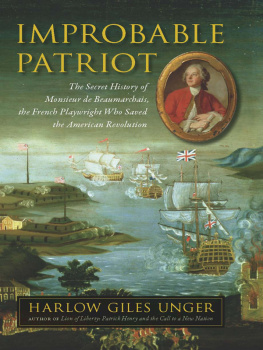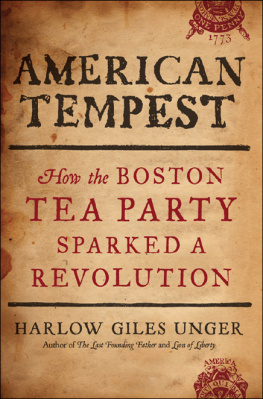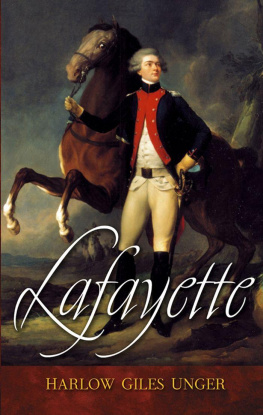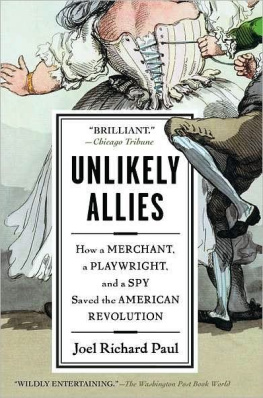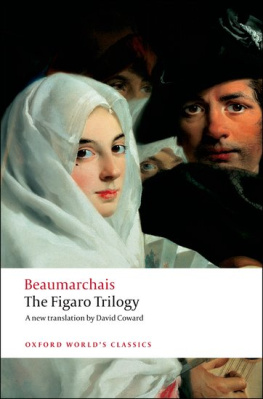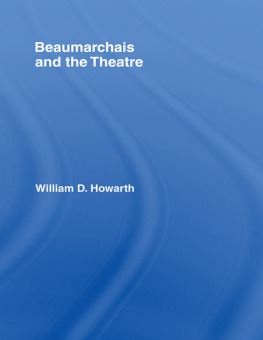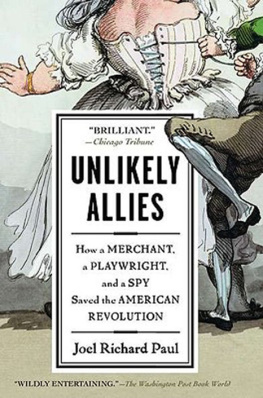Figaro and Dr. Bartolo
PREFACE & ACKNOWLEDGMENTS
IN 1853, Professor Louis de Lomnie of the Collge de France on the Left Bank in Paris described following one of Beaumarchaiss grandsons up to the attic of a house on the rue du Pas-de-la-Mule, which runs into the boulevard Beaumarchais. Indeed, the corner of rue du Pas-de-la-Mule and the boulevard Beaumarchais marks the corner of what had been the sumptuous one-acre Paris estate and home of Beaumarchais. The French government appropriated the entire property in 1818 and leveled it to make room for the big boulevard that now bears the Beaumarchais name and runs into the place de la Bastille.
What Lomnie says he found in that uninhabited and silent cell beneath a thick layer of dust were all the papers left fifty-four years ago by the author of Le Mariage de Figaro. When the government razed the Beaumarchais property, Lomnie explained, his papers were removed to a neighboring house and stored in the room where I found them. After the death of his wife and daughter, his son-in-law and grandchildren decided to leave the remaining Beaumarchais papers untouched and so they did, for twenty years, until they granted Lomnie access. Admitting that he felt as if I was performing an exhumation, Lomnie spent the next four years studying the Beaumarchais papers and writing what remains the definitive biography of Pierre-Augustin Caron de Beaumarchais. The Lomnie biography runs two volumes in French (one volume in the English translation) and is a vital resource for all Beaumarchais biographers. Lomnie was the only person to have had access to all the Beaumarchais papers during the fifty years after Beaumarchaiss death.
Although a trove of papers still exists, many of the papers that Lomnie examined and cited have disappeared either into private collections or into dust. No subsequent biographer (including me) has had access to as many original Beaumarchais papers as Lomnie which is the reason he is cited so often in the notes to this work. I have also drawn substantially from the work of Elizabeth S. Kite, an American studying in Paris at the dawn of the twentieth century. Deeply interested in rectifying the failure of Americans to recognize the role of Beaumarchais in securing our independence from England, she wrote a two-volume biography, drawing almost entirely from her translations of the Lomnie papers at a time when more of them were intact than now.
Since then, two world wars have dispersed innumerable collections of French manuscripts, and todays biographers and historians are heavily reliant on the work of these earlier researchers. What makes the ensuing work different from previous works on the subject has been my reliance on previously unpublished manuscripts and documents in the archives of the French Foreign Ministry in Paris and various collections in the United States, including those of the Library of Congress. In addition, my translations may vary considerably from previously published biographies of Beaumarchais, because I have tried to reflect the sense and intent of French quotations rather than simply providing a literal translation. This is especially important in translating the many double entendres the jeux de mots that are still such a basic element of everyday spoken French, and were especially so at the time of Beaumarchais. In addition, I have modernized spellings and syntax of French, English, and American manuscripts and documents to make reading easier and more pleasant.
Finally, a word of thanks to Pamela Madsen, at Harvard Universitys Harvard Theatre Collection, and to Micah Hoggatt, at Harvards Houghton Library, for their assistance in finding and reproducing scenes from The Barber of Seville. My thanks as well to the many freelancers and staffers at the University Press of New England who worked long and hard behind the scenes to produce this work, including Peter Fong, production editor, and Christi Stanforth, copyeditor. And lastly, my deepest thanks to my editor, Stephen P. Hull of UPNE, for his support in this project, and to my late literary agent, Edward W. Knappman, whose dogged persistence and boundless faith gave Figaro new life.
IMPROBABLE PATRIOT


We Must Help the Americans
AS 1776 NEARED ITS END, the news from America sent British King George III into paroxysms of joy. His army had routed the heralded George Washington and his so-called Continental Army. The American Revolution was all but over. Once numbering more than 30,000, Washingtons ragtag rebels had turned tail and run after crack British and Hessian troops landed on the eastern shore of Manhattan Island in New York. Even Washington galloped away to safety, as British buglers sounded the foxhunting call instead of the standard military charge. As Redcoats roared with laughter, Pennsylvania General Joseph Reed confessed, I never felt such a sensation before. It seemed to crown our disgrace.
Reduced by desertions to a pathetic band of 5,200, Washingtons Americans dragged their collective heels from New York across New Jersey and over the Delaware River into Pennsylvania, where they lay shivering on the ground, without tents, wrapped in rags, leaves, twigs anything their feet bleeding, fingers frozen, out of rum to keep them warm, their bodies thrust against each other for warmth, with no ammunition, awaiting the inevitable.

